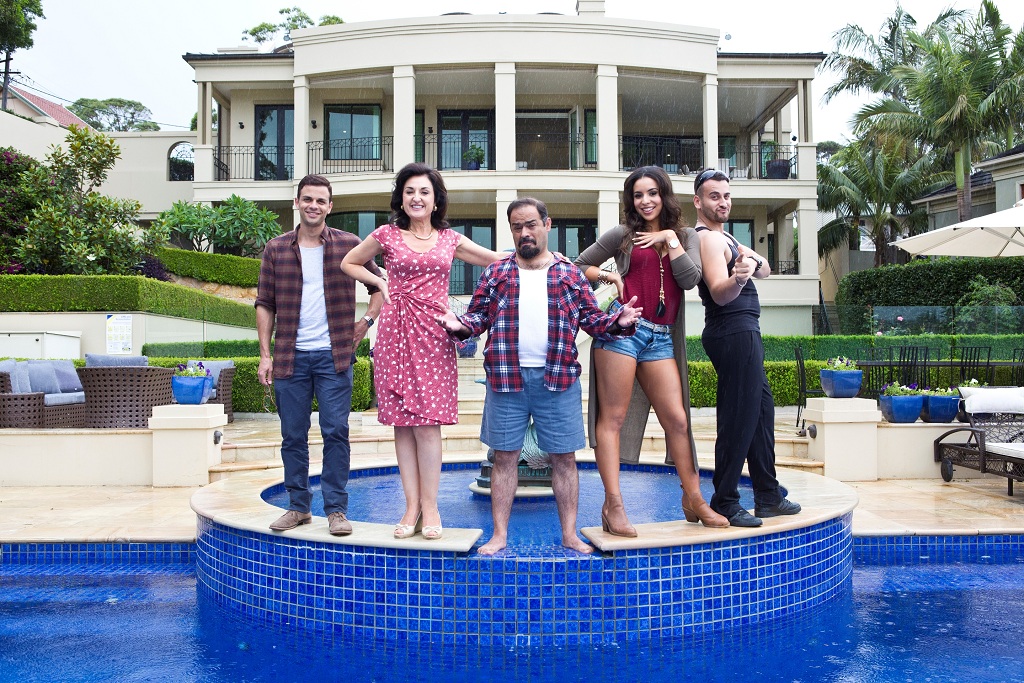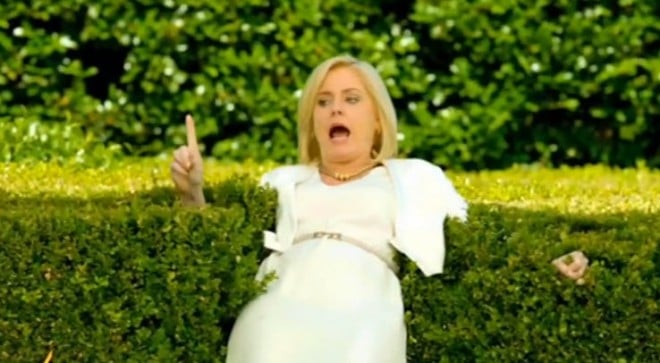‘Here Come The Habibs’ Review: Outrage Aside, Australia Deserves Better Comedy Than This
"Not as racist as it first appeared" isn't exactly a glowing review.

After all the hype, the global headlines, the backlash and the backlash against the backlash, Here Come The Habibs, Channel 9’s first locally scripted comedy show in 15 years, has finally hit our screens. The good news is the show isn’t as lowbrow and racist as the cliché-ridden, sloppily produced first trailer suggested. The bad news is that it also isn’t very funny.
Aside from SBS’ Struggle Street, it’s hard to think of another Australian show in recent memory that has been so furiously dissected and analysed before a second of it has gone to air. Media commentators and the show’s detractors demanded you pick a side — “are you pro or anti-Habibs?” And, as a result, the show will be judged by many on how it meets those expectations, rather than what it actually delivers. This is probably a good thing for its creators, given how low those expectations have been set.
–
A Flopping Fish Out Of Water
The show’s premise borrows heavily from a number of other fish-out-of-water stories (think At Home With the Braithwaites or The Beverly Hillbillies with more jokes about falafel and kebabs). A working class Lebanese family from Sydney’s western suburbs wins the lottery and moves to a mansion in the city’s luxurious, upper-class east. It’s a popular trope because, when done well, it can both be funny and provide sharp social commentary. Unfortunately for Habibs, while the occasional gag does land, it ultimately fails to deliver on its set up.
Even by the third episode — I watched ahead so you don’t have to — Habibs seems unable to figure out whether it’s an irreverent slapstick about bad neighbours or an attempt at satirising contemporary fears white Australians hold about Middle Eastern migrants. Because it keeps flip-flopping between the two, it never really does either that well.
The problem, if you take the show’s creators Rob Shehadie and Tahir Bilgic at their word, seems to be one of naivety. Shehadie has stated that Habibs was never supposed to focus on the “Anglo versus Lebs” dynamics, but instead work as a “clean family comedy”.
It isn’t crazy to imagine that, given Australia’s wide ranging cultural diversity, a comedy featuring a white family and a Lebanese family mightn’t need to explicitly focus on a ‘culture clash’ to find its humour. Sadly, however, that’s not what we get from Habibs. Its basic premise, cheesy soundtrack stacked full of Middle Eastern guitar riffs and stylised opening credits make sure of that. And the rest of the production doesn’t help. It might be due to the all-white writing team, or a desire by Nine to drum up ratings by courting controversy, but most of the attempted comedy in the show directly stems from awkward, race-based interactions between the main cast.
Habibs wants to be seen as a serious attempt at edgy comedy, but it slaps us in the face repeatedly with recycled, lazy jokes about terrorism, boat people, the Israel-Palestine conflict and rocket-propelled grenade launchers. It’s not that these jokes are racist; the problem is more that they are the kind I made in Year 9. They’re unoriginal and insensitive to the larger debates happening across the Australian community right now.
This is where the naivety kicks in. Even if Shehadie and Bilgic didn’t want the show to be about race relations and cultural conflict, art can’t so easily be divorced from its social context. Of course Habibs was going to have heightened scrutiny applied to it given global events, domestic terrorist attacks and secret government plans to monitor Lebanese migrants. Of course it was. So it’s completely understandable that members of the Lebanese-Australian community have expressed concern at the way migrants are depicted in the show.
This doesn’t mean the show is all about picking on the Habib family though. It’s not. Some of the funnier moments are when it skewers Sydney’s eastern suburbs as a collection of ignorant, nepotistic wankers who inherited their wealth. Most of the Anglo cast members are also regularly dressed in white, something I kept laughing at given how devastatingly accurate it is. What’s the deal with white people in the eastern suburbs always wearing white? Are they so proud of their whiteness that they have to clothe themselves in the colour?
Sadly most of the time Habibs gives us a critique of Sydney’s landed gentry, it rapidly pivots to unfunny slapstick, using the cultural tension as a comedic crutch. There’s the odd joke that punches up — like a dig at the Sydney Morning Herald’s irrelevance and a scene that sort of criticises the NSW Police for racial profiling — but every time you think Habibs is going to provide some insightful, humorous social commentary, it stops just short and gives you slapstick, highlighting the overriding tension behind the scenes. This is a show that doesn’t know what it’s trying to do.
–
Why Are Our Standards So Low?
I’m glad I waited to watch Habibs before casting judgement, but ultimately I’m disappointed. Shehadie and Bilgic were both involved in one of funniest, sharpest scripted Australian comedies ever produced, SBS’ Fat Pizza. Like Habibs, Pizza featured an ethnically diverse cast and made fun of white Australia’s insecurities. But it was actually funny and socially relevant. Pizza’s first episode featured jokes about political corruption, the precarious state of employment, and the exploitation of workers by dodgy bosses. Habibs gives us a piece of indoor lighting being mistaken for heavy weaponry. Not really biting stuff.
Far and away the best bits of the show focus around the younger cast members, particularly the chemistry between the youngest Habib, Elias (Tyler De Nawi) and his neighbour Madison (Georgia Flood). These scenes very rarely resort to slapstick or cultural stereotyping and feel more like real interactions between young people of different backgrounds who don’t quite feel like they fit in to the environment they’ve found themselves in.
It’s been disappointing to see critics and commentators so casually dismiss concerns Lebanese Australians have had about the Habibs. Numerous opinion pieces written by white authors have told us the show isn’t racist. Kyle Sandilands invited a Lebanese Australian critic of the program onto his show, just to repudiate her views by claiming, “It’s not a stereotype, every Lebo I know looks like they’re on that ad”. Even the ABC’s Luke Buckmaster declared authoritatively “the outrage apparatus has spoken too soon”.
Just because Habibs isn’t as racist as it first appeared doesn’t make it good television, and it doesn’t repudiate the concerns many migrant Australians have about the show and the way it was marketed. Shows like The Family Law on SBS demonstrate how it’s possible to represent Australia’s cultural diversity in a way that doesn’t rely on the overused ‘culture clash’ trope. Is it wrong for other migrant groups to want to be represented in a more genuine way, and not reduced to punch lines in unfunny comedies written by white people?
My Lebanese family Christmas is funnier than Here Come the Habibs.
— Catherine Kelleher (@catcallfilms) February 10, 2016
Hopefully one day Australia’s cultural diversity will be adequately represented across the media, so we don’t have to dissect and analyse every facet of novelty shows like the Habibs. Until then, the best we’ve got is “Not as racist as it first appeared”.
–
Here Come The Habibs airs on Channel Nine Tuesdays at 8.30pm.
–
Osman Faruqi is a Sydney writer and broadcaster. You can follow him on Twitter at @oz_f.
